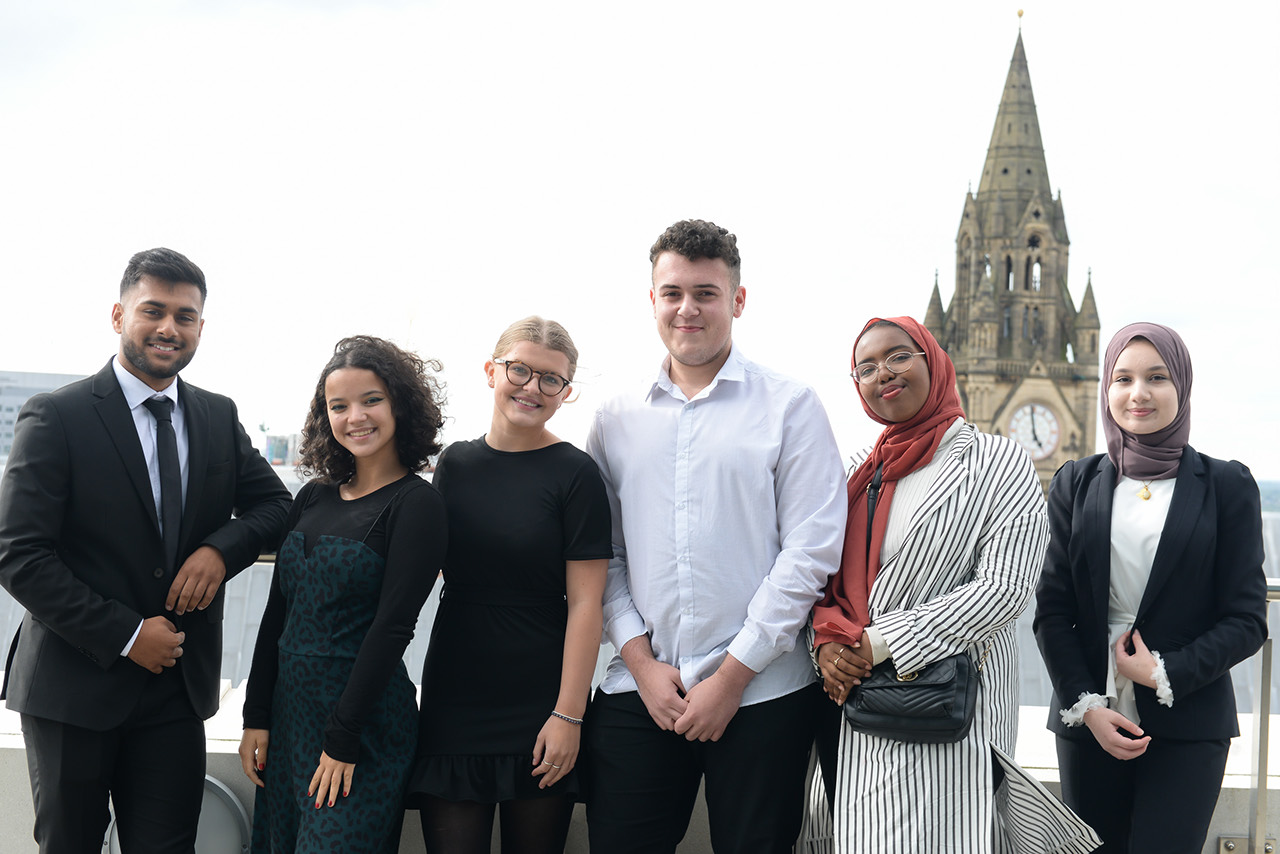The EY Foundation is a charitable company registered in England and Wales and Scotland with registered charity number 1157154 and SC045076. It is also a member firm of Ernst & Young Global Limited

Our Work Experience Research Insight Report, produced by Groundswell Innovation, is now available to download.
Over the last ten years, EY Foundation has offered paid work experience to 16–19-year-olds as part of its employability programmes. In that time, the work experience landscape across the UK has become more fragmented, more challenging, and ultimately, more unequal (1).
With our ambition to generate the systemic change needed to build a fairer workplace, we have set ourselves the bold goal to create a work experience revolution. This will ensure all young people eligible for free school meals participate in meaningful work experiences, with wrap-around support at key points in their education.
A new model of delivery will be tailored to local needs, with specific opportunities in different locations and sectors of the economy designed to increase a young person’s social capital through their experience of the working world. To grow the impact of this work, we will share insights with others who are pioneering change in this area, such as the Careers & Enterprise Company equalex approach which has been designed to support two weeks' worth of work experience for every young person as part of the MBacc pilot in Greater Manchester (2).
Why do we need a revolution?
To fully understand the national work experience landscape, and find a workable solution to its challenges, we commissioned Groundswell Innovation to research what constitutes good work experience and explore the potential for digital solutions to generate better outcomes.
The Work Experience Research Insight Report, published today, brings together analysis of existing studies, with findings from ten key stakeholder interviews and an in-school focus group.
This work has identified numerous avenues to transform work experience. Most notably;
The importance of support for Small and Medium sized Employers (SMEs) to deliver work experience across the UK
The potential for technology to act as a democratising force by making the skills gained through work experience more accessible for all
The importance of starting careers-related learning in early years to build aspirations.
These are all areas we will explore through pilot projects. In addition, this research has prompted us to reflect on our current model of paid work experience, to assess whether we can add additional value to the work experience landscape and consider what more needs to be done to achieve our ambition to transform work experiences for all young people.
What follows in this article is an overview of these reflections.
The Benefits of Work Experience
The report reiterated the transformative impact of work experience placements on young people and in particular, those from a low-income background; ‘With a bigger aspiration and experience gap to bridge (relative to (more) privileged families) FSM students can benefit from a strongly transformative effect from work experience, if it is designed and executed well (3).’
At least speaking from my perspective, in academics, education, schooling system, everything you've done to an extent has been theoretical or at least 'prototypes'. So what this opportunity/ programme does for you - it puts you in a really unique situation where you're working on real life complex problems that affect the people that you interact with on a day-to-day basis.
Work experience is also not solely for the benefit of young people. The research found there are multiple benefits for employers in engaging young people through work experience in their organisation.
This includes developmental opportunities for staff managing placements, an increased diversity of thought within the organisation, and chance to nurture a talent pipeline. In addition, though harder to quantify, we have also seen employer benefits include insights into the next generation of employees and the reward of having made a difference to a young person’s life.
Work experience is also beneficial to us as an employer. Through engaging with EY Foundation to deliver work experience we were able to a) understand the skills gap between what students are being equipped with and what we need as an employer, b) better understand what the next generation of employees need from is in terms of values and culture, and c) improve our awareness of how to communicate and manage entry level employees. All of this was on top of the expected feeling of doing something good for the next generation.
Engaging both sides of the labour market to design successful work experience programmes is vital, and key to our approach at the Foundation. In recent years we have scaled up our work with employers and industry bodies to co-design and co-deliver 12 sector-based programmes. We work closely with employers to understand their business challenges and incorporate opportunities for young people to offer their insights and views. Employers are consistently impressed by the perspectives young people offer them, often initiating fresh solutions in employer practices, while providing meaningful programmes for young people, volunteers and employers. We have been particularly successful with convening employers across Financial Services, Tech, Security, Government, and Real Estate.
What is ‘good’ work experience?
A key question to be answered in the pursuit of a work experience revolution is, what does ‘good’ work experience look like? What are we aiming for? And how can it be delivered?
From the interviews, focus group, and extensive desk research, the report highlights essential elements to a successful work experience programme. One that includes both traditional work experience placements, and the wider wrap-around and preparatory support reflected in the Gatsby Benchmarks for high-quality careers education.
With our decade of delivery, we’re pleased to see our existing model is reflected in these findings.
For an outline of our existing model, see our Work Experience Framework.
Challenges and opportunities
We know what we do works. Our annual impact reports demonstrate what we do is transformational for the young people we support. But we know we can always improve. We’ll be taking the proposed areas of exploration set out in the research to pilot new ways of delivering work experience. The findings from these pilots will then be used to evolve how we deliver work experience across our programmes.
Looking beyond our own programme delivery, we cannot directly reach every young person from a low-income background.
We recognise the huge dedication of the schools we work with, our recent Impact Awards highlighted just how devoted school leaders are to delivering the best for their students.
We also recognise that they are going above and beyond in challenging circumstances, sharing limited resources between an ever-growing list of priorities.
This research highlights there are underlying issues of a lack of funding, and inconsistency in the delivery of work experience. It is the less advantaged schools that are suffering the most. Speakers for Schools Work Experience for All Research found privately educated students are twice as likely to do multiple placements as state school students (4).
There are ways to solve this problem.
Building on our decade of delivery, we will use the findings of this research to inform our approach to a place-based pilot in Bradford, working with key stakeholders in the area to co-design a project that can be scaled nationally.
The persistent barriers to accessing work experience requires us to experiment with new solutions. The research shows technology can play a role in increasing work experience opportunities which are vital for supporting young people from low-income backgrounds prepare for the world of work
Since its inception in 1973 (5), the UK’s work experience model has failed to keep pace with the changing needs of young people and employers. A situation disproportionately impacting young people from a low-income background, who would benefit most from high quality work placements. This is the time for a work experience revolution.
To find out more about our work experience revolution, please contact: enquiries@eyfoundation.ey.com
[1] Speakers for Schools and The Social Market Foundation (2023) 'Learning from experience: How to make high quality work experience a reality for all'
[2] We are the MBacc Generation
[3] EY Foundation & Groundswell Innovation (2024) 'Work Experience Research Insight Report'
[4] Speakers for Schools (2022) 'Work Experience for All'


